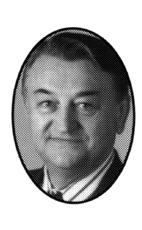Mr. Speaker, I shall be sharing my time with the hon. member for Cumberland-Colchester.
I shall keep my remarks brief because two parliamentary standing committees are waiting for my presence there also.
I am pleased that I have the opportunity to speak to Bill C-63, an act to amend the Canada Elections Act and the Referendum Act. This bill is greatly needed as it modernizes and improves the efficiency of our electoral administration. I am very pleased that this bill has been brought forward as I have believed for quite some time that it was necessary because of our inefficient enumeration process.
During every election we hear horror stories of residents of entire streets and whole apartment buildings not being enumerated. Many voters are omitted because they are travelling or working odd shifts during the enumeration period. Yet other voters are not enumerated because of language barriers or because they simply do not want to open their doors due to security concerns. It is sad but many people are afraid to open their doors when they are knocked on late in the evening. As a result they do not get enumerated. Others do not discover the omission of their names until they arrive at the polls on election day.
That is why on December 13, 1988, after the election, I urged Parliament to approve the following recommendations: first, to develop a registration process to establish permanent voters lists; second, to approve election day voter's registration in urban areas, the same right that is given to rural voters. Implementation of the latter recommendation has prevented discrimination against urban voters and guarantees Canadian voters their citizenship rights. It is our duty as parliamentarians to make it easier for citizens to vote, not to place obstacles in their way. Bill C-63 does just that.
I am pleased to see that through Bill C-63 a permanent voters register will be created. That will solve many of the problems I mentioned. The bill will pave the way to a 1997 election campaign based on 36 days as opposed to the current 47 days. This is an excellent move for it will save the federal government and the Canadian taxpayers a sum of $30 million per federal election.
The shortened election period will generate approximately $8 million of the $30 million savings to the Canadian taxpayers for each federal election. By having the permanent register with a shortened election period we can expect significant cost savings. Another benefit that results from this bill is that the permanent register can be shared with provinces, municipalities and school boards for their elections which would generate even more savings for Canadians.
Sharing and pooling resources makes a lot of sense. The permanent register of voters will be updated using data from Revenue Canada, lists of new Canadian citizens from Citizenship and Immigration Canada and from provincial and territorial motor vehicle and vital statistics data.
It is worth noting, as the bill states, that the register will be established from information collected by enumeration, but will be held outside the electoral period. Between electoral events these lists will be updated. No longer will Canadians be left off voters lists because of the short enumeration period and the obstacles I described earlier.
Bill C-63 is very convenient. When an election is called the preliminary lists will be distributed within five days of the issuing of the writs. Election expense limits will be available 31 days before polling day as opposed to the 24 days under the current
legislation. This will allow the candidate to assess earlier what his or her expense limits are.
The objects of Bill C-63 and the amendments are very clear: to make our electoral administration more practical and efficient. As someone who has campaigned as a Liberal candidate in five elections, winning four and losing one, I applaud the government for this bill and I am certain that Canadians will support it as well. I am pleased we will have good support from the opposition parties on this bill.

